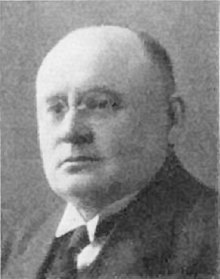Sebastian Schlittenbauer
Sebastian Schlittenbauer (born January 21, 1874 in Wolnzach , † November 6, 1936 in Munich ) was a German politician of the Bavarian People's Party .
Live and act
Schlittenbauer was born in 1874 as the son of Gütler Andreas Schlittenbauer and his wife Ursula, née Peller. He attended elementary school in Wolnzach from 1880 to 1887 , then from 1887 to 1894 the humanistic high school in Metten and in 1895 the new high school in Regensburg. From 1895 to 1899 he studied classical philology in Munich . After passing the two state exams doctorate Schlittenbauer there in 1901 to Dr. phil . At this time he began to get involved in the Bavarian section of the Catholic Center Party .
From 1900 to 1916 Schlittenbauer worked as a teacher of historical-philological subjects, including from 1911 to 1913 at the New Gymnasium in Bamberg , then in Munich. From 1916 to 1920 he worked in the civil service.
In 1909, sledge maker Kunigunde married Dresel (1863–1913) from Würzburg. In 1917 he married Sofie Hümmer, widowed Schirmer (1875–1966). He did not have any biological children, but did have an adopted daughter, Gabriele, who died in 1931. Schlittenbauer's step-son-in-law was the veterinarian and slaughterhouse director Ludwig Rupp from Dillingen an der Saar.
In the state elections of 1912, he was elected for the center in the Chamber of Deputies of the Bavarian State Parliament, to which he was initially to belong until 1918. In 1913, Schlittenbauer became honorary general secretary of the Bavarian Christian Farmers' Association. In 1916, Schlittenbauer was appointed 2nd director of the Regensburg Central Agricultural Cooperative . In the same year he publicly advocated the overthrow of Reich Chancellor Theobald von Bethmann Hollweg and the resumption of unrestricted submarine warfare. He was also a member of the War Food Office and a member of the board of directors of the Bavarian Water and Wasteland Cooperative Association.
In the last year of the war, and especially in the wake of the revolutionary events of November 1918, Schlittenbauer increasingly distanced himself from the leadership of the Center Party in Berlin, which, in his opinion, was far too far to the left and infected by "socialism". On November 12, 1918, Schlittenbauer finally broke with his old party when he and Georg Heim founded the Bavarian People's Party (BVP) in Regensburg .
From 1919 onwards, Schlittenbauer belonged to the Bavarian state parliament for the newly founded party, in which he was represented until 1933. In addition, since 1919 he was a member of the Bavarian Chamber of Agriculture and the State Railway Council. He appeared journalistic through a number of political writings as well as through articles and essays in newspapers and magazines such as the Süddeutsche Monatshefte . The institution of the farmers' association tried to use Schlittenbauer as a platform for the establishment of a professional second chamber. In addition, there were textbook publications and contributions to didactic debates. In September 1930 he was elected to the Berlin Reichstag as his party's candidate for constituency 24 (Upper Bavaria-Swabia) , to which he belonged until July 1932.
After the National Socialists came to power in 1933, Schlittenbauer was briefly arrested and forced into retirement. He died in 1936.
Fonts
Dissertation:
- The tendency of Cicero's Orator , Leipzig 1903.
Political Writings:
- A call for help from German agriculture. A presentation to the Reich Chancellor and the German Reichstag , 1916. (with Georg Heim)
- The Bavarian center and the question of the war economy , slea
- The state regulated cattle and meat supply 3. The state regulated cattle and meat supply , 1916.
- Look around, the fox is walking around! , 1917.
- The Bavarian Law on Farmers' Chambers of March 20, 1920. In addition to electoral regulations, enforcement regulations and announcement of March 27, 1920 on the representation of agricultural workers , 1920.
- The importance of industry, trade and commerce in Bavaria , Munich 1922.
- The financial policy of the empire and its repercussions on the Bavarian state budget: From the speech to the Bavarian. State budget in Bayer. State Parliament on December 4, 1928 , 1929.
- The financial policy of the Reich and its repercussions on the Bavarian state budget , (= BVP pamphlets No. 5) s. l. e. a.
Didactic publications:
- Materials on Latin Stylistics 8. Materials on Latin Stylistics , 1910.
- The German essay in middle school. Criticism and suggestions. Lecture given at the Munich High School Teachers' Association , Nuremberg 1912.
- Latin exercise book for the 4th grade (lower tertia) of the humanistic grammar school and the secondary school , Bamberg 1926.
literature
- Claudia Friemberger: Sebastian Schlittenbauer and the beginnings of the Bavarian People's Party , (= research on state and regional history 5), Sankt Ottilien 1998.
Web links
- Literature by and about Sebastian Schlittenbauer in the catalog of the German National Library
- Sebastian Schlittenbauer in the database of members of the Reichstag
Individual evidence
- ↑ Eugen Brand: The first 25 years of the new grammar school Bamberg: (1890-1915) . Gärtner, Bamberg 1915, p. 11 ( digitized version ).
- ↑ Stefanie Harrecker: Degraded Doctors. The withdrawal of the doctorate at the Ludwig Maximilians University of Munich , 2007, p. 349.
| personal data | |
|---|---|
| SURNAME | Sledge builder, Sebastian |
| BRIEF DESCRIPTION | German politician (BVP), MdR |
| DATE OF BIRTH | January 21, 1874 |
| PLACE OF BIRTH | Wolnzach |
| DATE OF DEATH | November 6, 1936 |
| Place of death | Munich |
